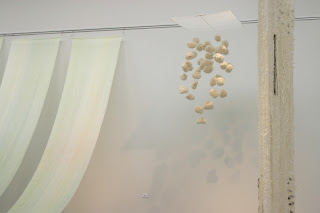Tradition vs. innovation, the practical vs. aesthetics and the collective vs. the individual.
These "which ways" as Kaime calls them are the bones of culture and language and our own personalities.
As we hunt for a school for Kaime having these things line up in a way we like seems such an important matter.
To a large degree we crossed the Hudson Bay and the Arctic Circle and came here to offer Kaime an expanded view--a view different from the one he might get if he grew up exclusively in Acworth.
Of course I look at the Japanese aesthetic with freshness of non-native eyes too. I am continually surprised.
The other day we went to meet a violin teacher--
quite an accomplished violinist--who by pure luck and chance is living right here in the same group of buildings. When we went in her door it was like a contest of apologies, Ms. Morimoto was apologizing about the size and quality of her home and Yumiko was apologizing about our intruding into her lovely space. I had a hard time believing it, but they were very serious about going through all the twists and turns.
American are from the wild wild west. The private space and individual characteristic are thought to be as scared as one right to own collect and in some cases carry firearms. The politics is a canvas of colorful if not always so thoughtful preachers; carnival barkers pushing ideas that they try to wind into the DNA of the constitution and the "Founding Fathers." Barak Obama and Sarah Palin are in the ring and sweaty, their fans and cynics in the stands hurling expletives and foul smelling refuse while the whole thing is being broadcast live. Across the seas, here in Japan the many colorless bureaucrats deal out of the public eye. Few of the greater public have much interest in these drama less machinations and individual politicians remain in the background unless scandal catches them with their hand in the jar. They do, however, get the job done. The streets are immaculate, the trash is recycled in ever more sophisticated ways and yesterday I saw bank upon bank of solar panels, the largest solar setup I ever seen, being installed between the different directions on a large highway. The people I was with didn't seem to notice.
The first time I came to Japan I was struck by the quality of the shared infrastructure.The trains, buses, roads the public baths, the schools, the health system. The idea of team work--which is little more than a cooperative competitive alliance in the US--is a kind of group consciousness here. Politeness and protocol rule over individual expression and creative rebellion. On a bus a little chime and a soft sounding recorded voice, along with an updating information screen, lets you know what the next stop will be. The driver warns you two times, "
走します"as he carefully starts the bus moving.
Though it is so impressive and I love the way
things actually work and the people are polite I am by nature drawn to the rebels and pirates. I'm fascinated by the "pirate" gardeners down by the Yada River. City, highway, buildings and trains all around and these native souls are doing something so natural and old it trumps the building and the city's goings on by it's humanness.
We'll grow a garden of some size here--tsubaki are already blooming here--whether just on our terrace or we'll find a plot somewhere close--or maybe I'll go join the pirate gardeners....





 I
I















